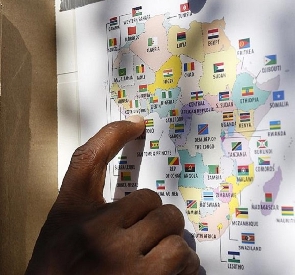 A number of African countries are probing COVID-19 related corruption
A number of African countries are probing COVID-19 related corruption
Even as the pandemic continues to ravage the world, some countries have reported continued theft of Covid-19 response funds.
In Africa, a number of countries have reported rampant corruption and theft of cash and other incentives meant to caution against the impacts of the disease.
Below are countries that have reported cases of corruption on Covid-19 funds.
Malawi
Malawi police arrested 64 people in April in connection with the misuse of Covid funds.
An audit report ordered by President Lazarus Chakwera revealed that government officers and the private sector had misspent about $1.3 million of the funds through procurement and allowance irregularities.
President Chakwera had initially warned he will crack the whip on looters linked to the theft of Covid-19 funds. He later sacked the labor minister in connection to the mismanagement.
It is reported that the former minister borrowed about US$760 from the Covid-19 funds to use as his allowance when he accompanied Chakwera on his first official visit to South Africa in November last year.
Kenya
An investigation done by a Kenyan journalist revealed in 2020 gross misconduct and abuse of funds meant for Covid-19.
T the state-run Kenya Medical Supplies Agency (KEMSA), at the center of a growing scandal that has prompted strikes at ill-equipped hospitals and street protests.
KEMSA is under fire over allegations government officials and businessmen pilfered $400 million in public money earmarked for medical equipment needed in the fight against coronavirus.
Investigations are currently underway but no one is taking the blame as all fingers point into a well-orchestrated deal set up by government officials.
Preliminary reports indicate that tenders were allocated to individuals who had no history or connection to medical tenders. One witness confessed she won the tender when it accidentally happened that she was passing by the KEMSA offices.
Nigeria
In April 2020, Nigeria received US$3.4 billion in emergency financial assistance from the IMF to support its COVID-19 response. Two months later, Nigeria’s federal government announced a US$6 billion stimulus.
A survey by Nigeria’s National Bureau of Statistics (NBS) found that by July 16, just 12.5 percent of the poorest quintile of respondents had received some form of food assistance since the pandemic began.
Another NGO known as CivicHive revealed through the Bureau of Public Procurement that the federal health ministry had spent $96,000) on 1,808 ordinary face masks.
Uganda
Four top Ugandan government officials were arrested in 2020 after being accused of inflating Covid-19 relief food prices. It is alleged they were arrested for causing the Ugandan government to run at a loss of $528,000.
Leaked audio obtained by a local media was published in August last year where Uganda’s Ambassador to Copenhagen, Nimisha Madhvani, her deputy and other staff members coercing a plan to share funds meant for Covid-19 response.
South Africa
Nothing changed in South Africa. Theft, over-pricing and potential fraud are just but a few scandals relating to the Covid-19 funds.
Public anger over suspect government contracts worth nearly $900 million for the purchase of supplies to fight COVID-19 may finally bring the South African government to take more decisive steps against corruption, say experts.
In one instance, personal protective equipment (PPE) was bought five times more than the normal price according to the auditor general.
The government had earlier allocated 350 rands per month for those who are unemployed
The country’s auditor general revealed that out of 4 million people in the database who directly benefited from the Covid funds, 30,000 of them needed to be investigated.
Some of the alleged corruption was grand and complex, involving front companies moving millions of dollars through a web of bank accounts.
Other schemes were shamelessly simple, like overcharging for blankets to be given to the poor as winter set in. One, a $670,000 order to buy motorcycles with sidecars to use as ambulances for COVID-19 patients, was just absurd.